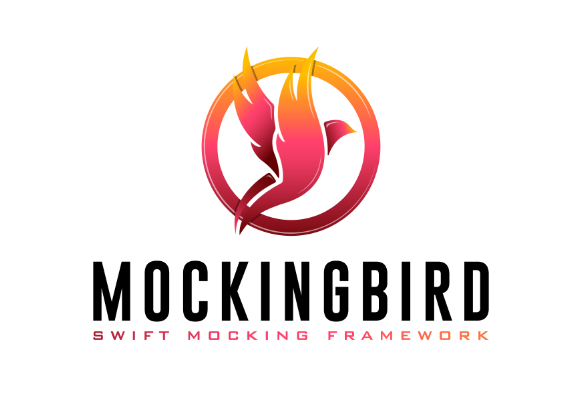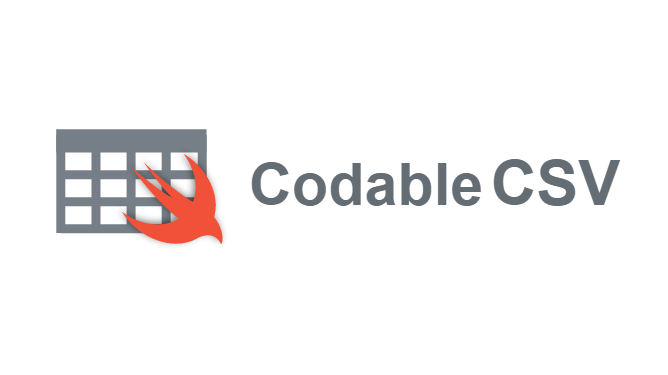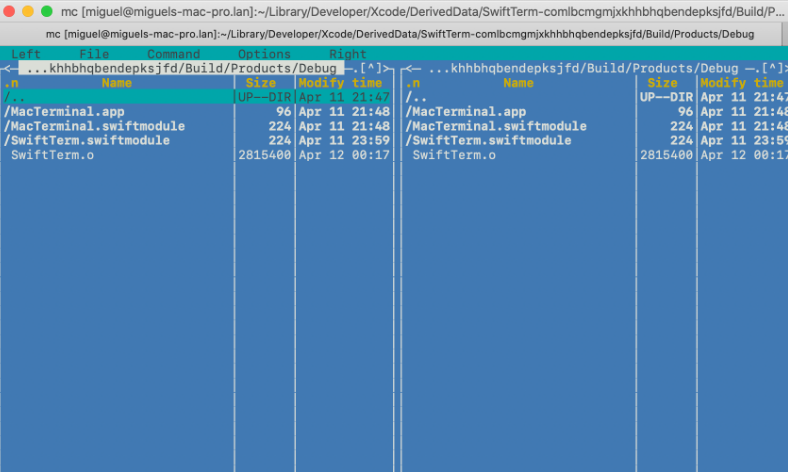mockingbird
Mockingbird is a Swift mocking framework that lets you throw away your hand-written mocks and write clean, readable tests.
- Expansive coverage of Swift language features
- Mock classes and protocols in a single line of code
- Support for generics, inheritance, static members, nested classes, type aliasing, etc.
- Seamless integration with Xcode projects
- Automatic discovery of source and dependency files
- Handling of external types from third-party libraries
- Convenient testing API
- Clear stubbing and verification error messages
- Support for asynchronous code, in order verification, default return value stubbing, etc.
Under the Hood
Mockingbird consists of two main components: the generator and the testing framework. Before each test bundle
compilation, configurable mock objects are created by implementing protocols and subclassing classes. The testing
framework hooks into the generated code and provides APIs for mocking, stubbing, and verification.
A Simple Example
protocol Bird {
var canFly: Bool { get }
func fly()
}
class Tree {
let bird: Bird
init(with bird: Bird) {
self.bird = bird
}
func shake() {
guard bird.canFly else { return }
bird.fly()
}
}
func testShakingTreeCausesBirdToFly() {
// Given a tree with a bird that can fly
let bird = mock(Bird.self)
let tree = Tree(with: bird)
given(bird.getCanFly()) ~> true
// When the tree is shaken
tree.shake()
// Then the bird flies away
verify(bird.fly()).wasCalled()
}
Installation
CocoaPods
Add the framework to a test target in your Podfile, making sure to include the use_frameworks! option.
target 'MyTestTarget' do
use_frameworks!
pod 'MockingbirdFramework', '~> 0.11'
end
Initialize the pod.
$ pod install
Then install the CLI.
$ cd Pods/MockingbirdFramework
$ make install-prebuilt
Carthage
Add the framework to your Cartfile.
github "birdrides/mockingbird" ~> 0.11
Build the framework using Carthage and link it to your test target, making
sure to add the framework to a Copy Files build phase with the destination set to Frameworks.
$ carthage update
Then install the CLI.
$ cd Carthage/Checkouts/mockingbird
$ make install-prebuilt
Swift Package Manager
Add https://github.com/birdrides/mockingbird as a dependency and link it to your test target.
Then download and install the
latest CLI from Releases.
From Source
Clone the repository and build the MockingbirdFramework scheme for the desired platform. Drag the built
Mockingbird.framework product into your project and
link it to your test target.
$ git clone https://github.com/birdrides/mockingbird.git
$ cd mockingbird
$ open Mockingbird.xcodeproj
Then build and install the CLI.
$ make install
Setup
Use the CLI to configure a test target, listing all source targets that should generate mocks before each build. Below,
mock types will be generated for the Bird app target and the BirdManagers framework target, which can then be
used in BirdTests.
$ mockingbird install \
--target BirdTests \
--sources Bird BirdManagers
Need to set up your project manually?
System Framework Compatibility
For basic compatibility with the Swift standard library and other system frameworks, download the latest
starter supporting source files
and place the MockingbirdSupport folder in the root directory of your project. Note that supporting source files
should not be imported into Xcode or added to any targets. See Supporting Source Files
for more information.
Excluding Files
You can exclude unwanted or problematic sources from being mocked by adding a .mockingbird-ignore file.
Mockingbird follows the same pattern format as .gitignore
and scopes ignore files to their enclosing directory.
Usage
Example projects demonstrating basic usage of Mockingbird:
Mocking
Mock types can be passed in place of the original type and are suffixed with Mock. Avoid explicitly coercing mock
types into their supertype, as this breaks stubbing and verification.
Protocol Mocks
Note that the initialized mock type is BirdMock instead of Bird.
let bird: BirdMock = mock(Bird.self) // The concrete type is `BirdMock`
let inferredBird = mock(Bird.self) // but type inference also works
Class Mocks
Initialize concrete class mocks using the initialize method. Keep in mind that class mocks rely on subclassing
which has certain limitations, so consider using protocol mocks whenever possible.
class Bird {
let name: String
init(named name: String) { self.name = name }
}
let bird = mock(Bird.self).initialize(named: "Ryan")
Stubbing
Stubbing allows you to define a custom value to return when a mocked method is called.
given(bird.getName()) ~> "Ryan"
Methods with Parameters
You can use an argument matcher when stubbing methods with parameters. Stubs added
later have precedence over those added earlier, so stubs containing specific matchers should be added last.
given(bird.canChirp(volume: any())) ~> false // Matches any volume
given(bird.canChirp(volume: notNil())) ~> true // Matches any non-nil volume
given(bird.canChirp(volume: 10)) ~> false // Matches volume = 10
Properties
Stub properties with their getter and setter methods.
given(bird.getName()) ~> "Ryan"
given(bird.setName(any())) ~> { print($0) }
Getters can be stubbed to automatically save and return values.
given(bird.getName()) ~> lastSetValue(initial: "Ryan")
bird.name = "Sterling"
print(bird.name) // Prints "Sterling"
Complex Stubs and Throwing Errors
Use a closure to implement complex stubs that contain logic or that interact with arguments.
given(bird.chirp(volume: any(), callback: any())) ~> { volume, callback in
callback(volume * 2)
}
Closures also allow for stubbing methods that can throw errors.
given(bird.chirp(volume: any())) ~> { volume in
if volume > 42 {
throw BirdError.invalidVolume
}
}
Relaxed Stubbing with Default Values (0.12.0)
Mocks are strict by default, meaning that calls to unstubbed methods will trigger a test failure. Methods returning
Void do not need to be stubbed in strict mode.
let bird = mock(Bird.self)
print(bird.name) // Fails because `bird.getName()` is not stubbed
bird.fly() // Okay because `fly()` has a `Void` return type
To return default values for unstubbed methods, use a ValueProvider with the initialized mock. Default values
have a lower precedence than values returned from concrete stubs.
let valueProvider = ValueProvider().register("Ryan", for: String.self)
let bird = mock(Bird.self)
useDefaultValues(from: valueProvider, on: bird)
print(bird.name) // Prints "Ryan"
// Values from concrete stubs have a higher precedence
given(bird.getName()) ~> "Sterling"
print(bird.name) // Prints "Sterling"
Mockingbird provides several preset value providers which are guaranteed to be backwards compatible.
.standardProvider
├── .collectionsProvider
├── .primitivesProvider
├── .basicsProvider
├── .geometryProvider
├── .stringsProvider
└── .datesProvider
let bird = mock(Bird.self)
useDefaultValues(from: .standardProvider, on: bird)
print(bird.name) // Prints ""
Sequence of Values (0.12.0)
Methods that return a different value each time can be stubbed with a sequence of values. The last value will be used
for all subsequent invocations.
given(bird.getName()) ~> sequence(of: "Ryan", "Sterling")
print(bird.name) // Prints "Ryan"
print(bird.name) // Prints "Sterling"
print(bird.name) // Prints "Sterling"
Verification
Verification lets you assert that a mock received a particular invocation during its lifetime.
verify(bird.fly()).wasCalled()
Verifying doesn’t remove recorded invocations, so it’s safe to call verify multiple times (even if not recommended).
verify(bird.fly()).wasCalled() // If this succeeds...
verify(bird.fly()).wasCalled() // ...this also succeeds
Methods with Parameters
Argument matching for verification follows the same syntax as stubbing.
verify(bird.canChirp(volume: any())).wasCalled() // Called with any volume
verify(bird.canChirp(volume: notNil())).wasCalled() // Called with any non-nil volume
verify(bird.canChirp(volume: 10)).wasCalled() // Called with volume = 10
Properties
Verify property invocations using their getter and setter methods.
verify(bird.getName()).wasCalled()
verify(bird.setName(any())).wasCalled()
Specific Number of Invocations
It’s possible to verify that an invocation was called a specific number of times with a count matcher.
verify(bird.fly()).wasNeverCalled() // n = 0
verify(bird.fly()).wasCalled(exactly(10)) // n = 10
verify(bird.fly()).wasCalled(atLeast(10)) // n ≥ 10
verify(bird.fly()).wasCalled(atMost(10)) // n ≤ 10
verify(bird.fly()).wasCalled(between(5...10)) // 5 ≤ n ≤ 10
Count matchers also support chaining and negation using logical operators.
verify(bird.fly()).wasCalled(not(exactly(10))) // n ≠ 10
verify(bird.fly()).wasCalled(exactly(10).or(atMost(5))) // n = 10 || n ≤ 5
Argument Capturing
Sometimes you need to perform custom checks on argument values by using an argument captor.
let nameCaptor = ArgumentCaptor<String>()
verify(bird.setName(nameCaptor.matcher)).wasCalled()
assert(nameCaptor.value?.hasPrefix("R"))
Ordered Invocations
To enforce the relative order of invocations, use an inOrder block.
// Verify that `fly` was called before `chirp`
inOrder {
verify(bird.fly()).wasCalled()
verify(bird.chirp()).wasCalled()
}
Pass options to ordered verification blocks for stricter checks with additional invariants.
inOrder(with: .noInvocationsAfter) {
verify(bird.fly()).wasCalled()
verify(bird.chirp()).wasCalled()
}
Asynchronous Verification
You can test asynchronous code by using an eventually block which returns an XCTestExpectation.
DispatchQueue.main.async {
Tree(with: bird).shake()
}
let expectation = eventually {
verify(bird.fly()).wasCalled()
verify(bird.chirp()).wasCalled()
}
wait(for: [expectation], timeout: 1.0)
Disambiguating Overloaded Return Types
For methods overloaded by return type, you should help the compiler by specifying the type returned.
protocol Bird {
func getMessage<T>() -> T
func getMessage() -> String
func getMessage() -> StaticString
}
verify(bird.getMessage()).returning(String.self).wasCalled()
Resetting Mocks
Occasionally it’s necessary to remove stubs or clear recorded invocations.
reset(bird) // Removes all stubs, values, and invocations
clearStubs(on: bird) // Only removes stubs
clearDefaultValues(on: bird) // Only removes default values
clearInvocations(on: bird) // Only removes recorded invocations
Argument Matching
Argument matching allows you to handle parameterized methods for stubbing or verification.
Exact Value
Match specific values by passing a concrete instance. The parameter type must explicitly conform to Equatable or
the arguments will be compared by reference.
// Many Swift standard library types such as `String` conform to `Equatable`
verify(bird.setName("Ryan")).wasCalled()
// Types that explicitly conform to `Equatable` work out of the box
struct Fruit: Equatable {
let size: Int
}
verify(bird.eat(Fruit(size: 42))).wasCalled()
// Classes can be safely compared by reference
class Tree {
init(with bird: Bird) {
bird.home = self
}
}
let tree = Tree(with: bird)
verify(bird.setHome(tree)).wasCalled()
Wildcard and Non-Equatable Matching
Argument matchers allow wildcard and custom matching of arguments that don’t conform to Equatable.
any() // Matches any value
any(of: 1, 2, 3) // Matches any value in {1, 2, 3}
any(where: { $0 > 42 }) // Matches any number greater than 42
notNil() // Matches any non-nil value
For methods overloaded by parameter type (such as with generics), using a matcher may cause ambiguity for
the compiler. You can help the compiler by specifying an explicit type in the matcher.
any(Int.self)
any(Int.self, of: 1, 2, 3)
any(Int.self, where: { $0 > 42 })
notNil(String?.self)
You can also match elements or keys within collection types.
any(containing: 1, 2, 3) // Matches any collection with values {1, 2, 3}
any(keys: "a", "b", "c") // Matches any dictionary with keys {"a", "b", "c"}
any(count: atMost(42)) // Matches any collection with at most 42 elements
notEmpty() // Matches any non-empty collection
Floating Point Values
Mathematical operations on floating point numbers can cause unexpected behavior, so consider using around to
fuzzily match floating point arguments with some tolerance.
around(10.0, tolerance: 0.01)
Supporting Source Files
Add supporting source files whenever inheriting or conforming to types defined outside of your project. For example
protocol BirdBrain: Codable {} inherits from the Swift standard library type Codable. In order to generate
the methods encode(to:) and init(from:) for BirdBrain, the definition for Codable needs to exist in the
supporting source files like so:
/* MockingbirdSupport/Swift/Codable.swift */
public protocol Encodable {
func encode(to encoder: Encoder) throws
}
public protocol Decodable {
init(from decoder: Decoder) throws
}
public typealias Codable = Decodable & Encodable
Supporting source files do not allow you to generate mocks for external types such as those defined in third-party
libraries or frameworks. Please see Mocking External Types for
details and best practices.
Starter Pack
Mockingbird includes starter supporting source files for the Swift standard library and common system frameworks
such as Foundation. Download the latest
starter supporting source files
and place the MockingbirdSupport folder in the root directory of your project. Note that supporting source files
should not be imported into Xcode or added to any targets.
If you share supporting source files between projects, you can specify a custom --support directory when
running the CLI installer or generator.
Structure
Supporting source files should be contained in a directory that matches the module name. You can define
submodules and transitive dependencies by nesting directories.
MockingbirdSupport/
├── Foundation/
│ └── ObjectiveC/
│ └── NSObject.swift
└── Swift/
├── Codable.swift
├── Comparable.swift
├── Equatable.swift
└── Hashable.swift
With the above file structure, NSObject can be imported from both the Foundation and ObjectiveC modules.
Mockingbird CLI
Generate
Generate mocks for a set of targets in a project.
mockingbird generate
| Option | Default Value | Description |
|---|---|---|
--project |
(inferred) |
Path to your project’s .xcodeproj file. |
--targets |
$TARGET_NAME |
List of target names to generate mocks for. |
--srcroot |
$SRCROOT |
The folder containing your project’s source files. |
--outputs |
(inferred) |
List of mock output file paths for each target. |
--support |
(inferred) |
The folder containing supporting source files. |
--condition |
(none) |
Compilation condition to wrap all generated mocks in, e.g. DEBUG. |
| Flag | Description |
|---|---|
--disable-module-import |
Omit @testable import <module> from generated mocks. |
--only-protocols |
Only generate mocks for protocols. |
--disable-swiftlint |
Disable all SwiftLint rules in generated mocks. |
--disable-cache |
Ignore cached mock information stored on disk. |
--disable-relaxed-linking |
Only search explicitly imported modules. |
Install
Set up a destination test target.
mockingbird install
| Option | Default Value | Description |
|---|---|---|
--target |
(required) | The name of a test target to configure. |
--sources |
(required) | List of target names to generate mocks for. |
--project |
(inferred) |
Your project’s .xcodeproj file. |
--srcroot |
<project>/../ |
The folder containing your project’s source files. |
--outputs |
(inferred) |
List of mock output file paths for each target. |
--support |
(inferred) |
The folder containing supporting source files. |
--condition |
(none) |
Compilation condition to wrap all generated mocks in, e.g. DEBUG. |
--loglevel |
(none) |
The log level to use when generating mocks, quiet or verbose |
| Flag | Description |
|---|---|
--preserve-existing |
Don’t overwrite previously installed configurations. |
--asynchronous |
Generate mocks asynchronously in the background when building. |
--only-protocols |
Only generate mocks for protocols. |
--disable-swiftlint |
Disable all SwiftLint rules in generated mocks. |
--disable-cache |
Ignore cached mock information stored on disk. |
--disable-relaxed-linking |
Only search explicitly imported modules. |
Uninstall
Remove Mockingbird from a (unit test) target.
mockingbird uninstall
| Option | Default Value | Description |
|---|---|---|
--targets |
(required) | List of target names to uninstall the Run Script Phase. |
--project |
(inferred) |
Your project’s .xcodeproj file. |
--srcroot |
<project>/../ |
The folder containing your project’s source files. |
Global Options
| Flag | Description |
|---|---|
--verbose |
Log all errors, warnings, and debug messages. |
--quiet |
Only log error messages. |
Inferred Paths
--project
Mockingbird will first check if the environment variable $PROJECT_FILE_PATH was set (usually by an Xcode build
context). It will then perform a shallow search of the current working directory for an .xcodeproj file. If multiple
.xcodeproj files exist then you must explicitly provide a project file path.
--outputs
By default Mockingbird will generate mocks into the $(SRCROOT)/MockingbirdMocks directory with the file name
$(PRODUCT_MODULE_NAME)Mocks.generated.swift.
--support
Mockingbird will recursively look for supporting source files in the
$(SRCROOT)/MockingbirdSupport directory.


